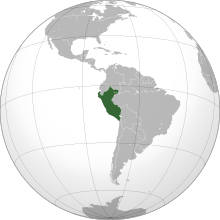LGBTQ rights in Peru | |
|---|---|
 | |
| Status | Legal since 1924[1] |
| Gender identity | Transgender people allowed to change legal gender without surgery |
| Military | Lesbians, gays and bisexuals allowed to serve openly since 2004 |
| Discrimination protections | Yes, sexual orientation and gender identity protections |
| Family rights | |
| Recognition of relationships | No recognition of same-sex unions |
| Restrictions | De facto unions banned by constitution |
| Adoption | No |
Lesbian, gay, bisexual, and transgender (LGBT) people in Peru face some legal challenges not experienced by other residents. Same-sex sexual activity among consenting adults is legal.[2] However, households headed by same-sex couples are not eligible for the same legal protections available to opposite-sex couples.
In January 2017, a decree issued by President Pedro Pablo Kuczynski took effect, prohibiting all forms of discrimination and hate crimes on the basis of sexual orientation and gender identity. In a landmark ruling published on 9 January 2017, the 7th Constitutional Court of Lima ruled in favor of recognizing and registering a same-sex marriage, between a Peruvian citizen and a Mexican citizen, performed in Mexico City in 2010. In March 2018, the ruling was reversed by the Supreme Court of Peru on procedural grounds.[3]
Homosexuality has been used as grounds for separation or divorce. Laws meant to protect "public morals", such as Article 183 of the Penal Code on "obscene exhibitions and publications", have also been used against lesbians and gays.[2] Society's attitude towards homosexuals has generally been hostile and is still heavily influenced by the Catholic Church. In the 1980s, the founding of the organisation Movimiento Homosexual de Lima (MHOL) managed to bring about at least a slight change in the way the media treated homosexuality. Known LGBT persons may face persecution by the public. During the first Lima Pride parade in 2002, most demonstrators wore masks to avoid persecution by the public.
- ^ Cite error: The named reference
ilga 2017was invoked but never defined (see the help page). - ^ a b Mendos, Lucas Ramón (2019). State-Sponsored Homophobia. Geneva: ILGA. p. 185.
- ^ Alayo Orbegozo, Fernando (29 March 2018). "Caso Ugarteche: anulan fallo que reconoció matrimonio homosexual". El Comercio (in Spanish).